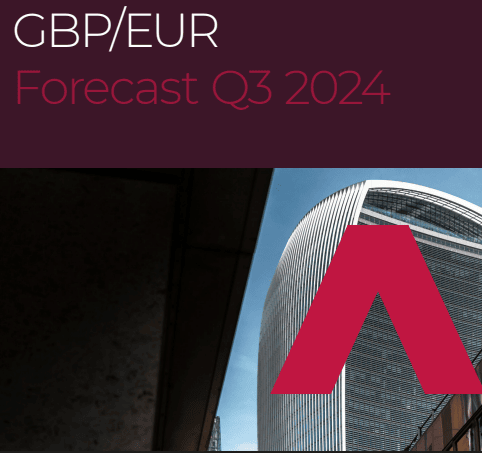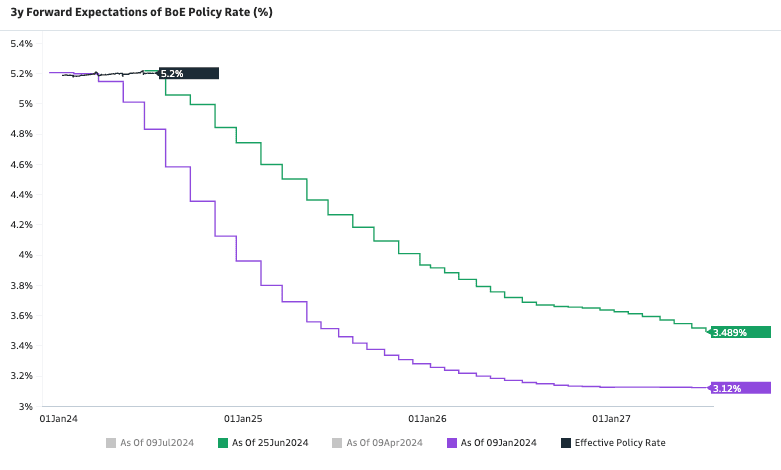
Above: File image of Huw Pill. Image © Global Utmaning, Lasse Skog. Modified from original, reproduced under CC licensing, non-commercial.
Pound Sterling received a boost after a key member of the Bank of England's rate-setting body signalled there was no immediate requirement to raise interest rates.
Monetary Policy Committee member and Chief Economist Huw Pill said it remained a question of "when rather than if" rate cuts "still seem appropriate."
However, speaking at Asia House in his first post-election appearance, Pill said he saw "uncomfortable strength" in services inflation, a signal the Bank might not feel it has the all-clear to cut interest rates on August 01.
Market-implied odds of an August rate cut receded to less than 50% following the comments, having been above 65% earlier in the day. The Pound to Euro exchange rate is higher by a quarter of a per cent on the day at 1.1852. The Pound to Dollar exchange rate is a third of a per cent higher at 1.2828.
Pill is the first permanent member of the Bank's Monetary Policy Committee to speak since the pre-election blackout period imposed on public servants. His words have helped markets adjust to the Bank's thinking in the wake of recent data that included another above-consensus service inflation print.
Market focus returns to domestic data and Bank of England interest rate policy after a brief period dominated by political changes in the UK and Eurozone. France's recent legislative upheaval offered the Pound to Euro exchange rate a leg-up to highs near 1.19, a level that will come back into contention if the odds of an August rate cut are fully erased by next week's inflation data release.
Sterling has a tailwind behind it: the UK's election had a limited impact, but some analysts say expectations for improved relations with the EU under the new government are constructive for the Pound's outlook.

Nevertheless, should next week's inflation and labour market data undershoot expectations, expect the odds of an August rate cut to rise once more. This can weigh on the Pound.
"The modestly positive sterling reaction to election week played out in line with our expectations. Now that the election outcome is fully priced in, the market’s attention turns to the upcoming UK inflation release and the likelihood of an August rate cut. The BoE’s election-induced communications 'blackout' has ended, providing a clearer path for an imminent rate cut," says Joe Tuckey, Head of FX Analysis at Argentex.
"Sterling may struggle to make further near-term gains after this solid run," he adds.
Analysts at Capital Economics say Pound-Euro could soon enter a protracted spell of depreciation.
"We think yield differentials will shift in favour of the euro in the coming months. That’s because our forecast for where the ECB’s deposit rate will settle is not far below the rate implied by market pricing whereas we think the Bank of England will cut Bank Rate faster and further than investors seem to expect," says Diana Iovanel, Senior Markets Economist at Capital Economics.
Above: Markets see fewer rate cuts, and at a slower pace, than was the case in January. This shift has supported Pound Sterling this year.
Markets still see a slow pace of easing in the coming months as the Bank remains cautious about the prospect of inflation proving stubborn. The Bank's central expectation is that inflation will nudge higher above the 2.0% target into year-end, necessitating caution.
However, Capital Economics thinks UK CPI inflation will fall to around 1.5% by the end of this year and will stay below the Bank’s target for some time.
This can give the Bank cover to cut interest rates by a greater degree than markets currently expect, materialising a decline in the Pound.
Capital Economics forecasts the EUR/GBP exchange rate to strengthen by about 5% by the end of 2025, from recent lows at 0.84 to 0.88. This would correspond to a GBP/EUR move to 1.1363.
To understand how this prediction contrasts with the consensus, request Corpay's H2 GBP/EUR forecast guide, as it contains the median forecasts of over 30 investment banks.

